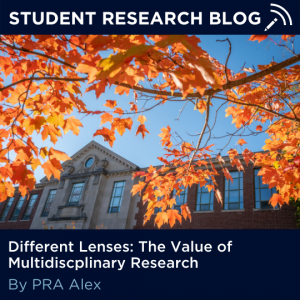By Alex Clonan, Peer Research Ambassador
 Research is all about asking questions, each one viewed through a different lens and perspective. Our academic background, experiences, passions, and interests shape these different lenses. Together, a diverse community of investigators can work to ask questions and strive towards understanding.
Research is all about asking questions, each one viewed through a different lens and perspective. Our academic background, experiences, passions, and interests shape these different lenses. Together, a diverse community of investigators can work to ask questions and strive towards understanding.
I’ll tell you a little bit about my lens. As a first-year Electrical Engineering student, I applied to the Health Research Program and ended up having the opportunity to work at the Center for Quantitative Medicine at UConn Health. To be honest, leading up to my first day in the lab, I was terrified, having little to no experience in whatever ‘systems biology’ was, but I was eager to learn. I wasn’t quite sure how my engineering background would fit in, or what I would be able to contribute.
On my first day, I met the amazing group of people I would work with for the upcoming months. I was surprised to find out every one of them came from a different academic background. We were working on creating a 3D model of the lung, and how an airborne fungal infection would be able to spatially infect the alveolus, along with how the body’s innate or immunocompromised state would be able to respond to the infection.
The project in itself was multifaceted, so our team had to be as well. We had people with academic backgrounds in Mathematics, working on air diffusion modeling equations. Bioinformaticians looked into the immune system density at the transcriptome level. Computer scientists developed software for the 3D model visualization and graphical user interface system. Biologists worked on wet-lab experiments to validate the model. Medical Doctors incorporated clinical data and planning interventions in a hospital setting. It was astounding to me, to have this multidisciplinary research experience and see how so many people from different backgrounds can come together and work as a team to solve a research question. Every different background brought a new lens and perspective to the research question, bringing it further into clarity and fruition.
Despite seeing this academic harmony, I still wasn’t sure how I fit in. The project I ended up working on was creating a Boolean model for the interactions between dendritic cells and the different polysaccharides exposed to the fungus. This was very far from my academic background in engineering. While initially there were many papers to read and identify, it prompted me to make my connections between the literature and my own experiences. The Boolean model I made was a close parallel to the digital logic design classes I had taken in the past, just spun a different way in a biological context. What initially was a cluster of biological information, became an elaborate circuit board like connection of ‘and’ and ‘or’ statements, generating a molecular level signaling pathway. Soon after my contributions to the project and place in the lab seemed to make more sense, it was just a matter of looking at the problem through my unique lens.
While it was an adjustment and a challenge for me, I appreciate how being in a multidisciplinary lab shaped my academic experience. I feel like it taught me how to look for novel connections, and understand the importance of collaboration. After the Health Research Program, I sought after more multidisciplinary experiences, where I now work in a lab combining psychology, neuroscience, and electrical engineering.
Look at research with an open mindset; don’t limit yourself to your major when looking through Lincus, or when looking for programs to apply to. Research is about learning, not just about the topic, but how to apply your own experiences. Your different lens is valued, and crucial to finding insights. I implore you to run towards these opportunities and embrace them as a place to learn and grow as a researcher.
Alex is a senior majoring in Electrical Engineering and Molecular & Cell Biology. Click here to learn more about Alex.